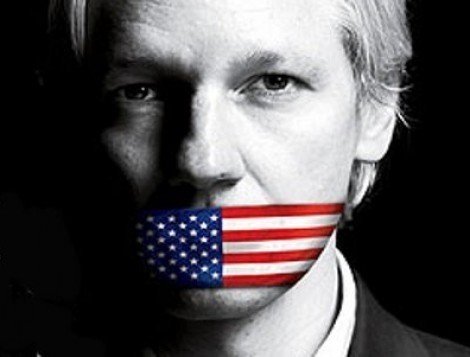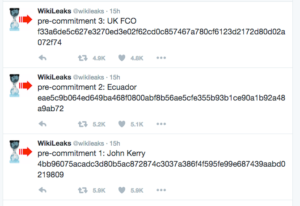🔊 NEW! Neocash Radio Ep. 178: Ethereum Hard Fork Funtime, Bitcoin Unlimited Possibilities, Wikileaks Dumps on Clinton, and the European Central Bank wants more cryptocurrency regulation

The European Central Bank wants more regulations on cryptocurrencies. The Deutsche Bank saga thickens. Wikileaks shows Hillary Clinton’s plans to “covertly” invade Syria. UK’s spy agency has been illegally operating for 17 years. Ethereum ain’t afraid of no fork. Bitcoin Unlimited gets some major support. Netflix releases documentary on mass incarceration and slave labor in the U.S.
All this and more on Neocash Radio episode 178 here on Wednesday October 19th, 2016!
RETWEET ALL THE THINGS @NeocashRadio!
on iTunes / Soundcloud / Stitcher / and Google Play Music!
We’re also on Tunein, Player.FM, Overcast.FM, Podcast Addict, Blubrry, and more!

We’ve also got a special bonus episode this Friday: we interview Bitcoin Angel Investor and Bitcoin.com CEO Roger Ver. We discuss how the current Bitcoin block size limit is throttling the Bitcoin network, and how Bitcoin Unlimited could be poised to increase the block size and allow the Bitcoin network to scale.
| Traditional Markets | Crypto Markets |
| Gold $1268.90 | Bitcoin (BTC) $630 |
| Silver $17.65 | Litecoin (LTC) $3.80 |
| Oil $51.43 | Ethereum (ETH) $12.00 |
| Dow Jones 18,202 points | DASH $10.40 |
| 30Y UST Yield 2.52% | Monero (XMR) $3.816 |
| STEEM $0.234 | |
| AMP $0.171 | |
| 1 Doge = 1 Doge |
European Central Bank to EU: Tighter Regulations, Less Anonymity on Digital Currencies
In a recent statement from European Central Bank president Mario Draghi supports EU lawmakers’ directive requiring digital currency exchanges and custodian wallet providers to license or register with the government.
Citing that digital currencies “could provide a means of financing illegal activities,” the ECB believes that national Financial Intelligence Units (FIUs) “should be able to associate virtual currency addresses to the identity of the owner of virtual currencies.”
Through all of this, the ECB wanted to remain adamant that Bitcoin and other “‘virtual currencies’ do not qualify as currencies from a Union perspective,” asserting that “the euro is the single currency of the Union’s economic and monetary union.” As such, Draghi recommends defining virtual currencies “more specifically, in a manner that explicitly clarifies that virtual currencies are not legal currencies or money.” Instead, the ECB would like to see them categorized as a means of exchange rather than as a means of payment.
Though Draghi made note that digital currencies and blockchains “may have the potential to increase the efficiency, reach and choice of payment and transfer methods,” he was quick to direct members to “take care not to appear to promote the use of privately established digital currencies, as such alternative means of payment are neither legally established as currencies, nor do they constitute legal tender issued by central banks and other public authorities.”
The ECB’s statement also points to two problems they see with digital currencies: 1) “unlike the holders of legally established currencies, the holders of virtual currency units typically have no guarantee that they will be able to exchange their units for goods and services or legal currency in the future” and 2) “the reliance of economic actors on virtual currency units, if substantially increased in the future, could in principle affect the central banks’ control over the supply of money with potential risks to price stability[.] Thus, while it is appropriate for the Union legislative bodies [...] to regulate virtual currencies from the anti-money laundering and counter-terrorist financing perspectives, they should not seek in this particular context to promote a wider use of virtual currencies.”
An update on Deutsche Bank
A Bloomberg article is spreading rumors that Deutsche Bank may be cutting back on US operations as a cost trimming measure. The New York Times is reporting on a company-wide hiring freeze. This past monday Deutsche Bank agreed to paying $38 million to settle allegations that it illegally conspired with other banks to fix the price of silver. This is one of the first in a wave of lawsuits against banks with conspiracy allegations of price rigging and rate fixing in financial and commodities markets.
The bad news does not stop there, 13 Bankers were charged with market manipulation and creating false accounts at the world’s oldest bank in Italy, Banca Monte dei Paschi di Siena. Besides Monte Paschi, former executives at Nomura Holdings Inc. and six current and former Deutsche Bank AG executives were named in the scandal. An investigation found that the executives created false accounts to hide losses. Monte Paschi used derivatives struck with Deutsche Bank to hide losses from an earlier derivative contract.
Deutsche Bank’s share price has fallen 50% this year while the world’s oldest bank, Banca Monte dei Paschi di Siena has seen share prices fall 84%.
Wikileaks Releases Damning Evidence Against Hillary Clinton; U.S. Government Tries to Blame Russia for the Hack & Ecuador Restricts Julian Assange’s Internet
Wikileaks has been releasing batches of emails from Hillary Clinton’s campaign manager (Bill Clinton’s former chief-of-staff) John Podesta, as well as excerpts from private speeches that Hillary gave to Wall Street bankers.
The Clinton campaign and the U.S. government have tried to claim that the emails may not be authentic, they’ve tried to claim that Trump and the Russian government carried out the hack in an effort to meddle in the election, and now Ecuador has severed Wikileaks’ founder Julian Assange’s internet connection, likely under political pressure.
One of the more damning revelations from the latest Wikileaks release is evidence that Hillary Clinton told a Goldman Sachs conference—that she was paid $225,000 to speak at—that she would like to intervene secretly in Syria. "My view was you intervene as covertly as is possible for Americans to intervene. We used to be much better at this than we are now. Now, you know, everybody can't help themselves. They have to go out and tell their friendly reporters and somebody else: Look what we're doing and I want credit for it."
She also added: "But if everybody's watching, you know, all of the back room discussions and the deals, you know, then people get a little nervous, to say the least. So, you need both a public and a private position."
Wikileaks also tweeted out three “pre-commitment keys”—a “cryptographic scheme to prevent unreleased information from being tampered with.” Those keys serve as proof that the contents of a future release have not been altered since the issuance of the key; any change to the leaks would also affect the 64-character keys. The topics listed with each key? Ecuador, John Kerry, and the UK government’s Foreign Office.

CNN has come under fire for very incorrectly stating that it was “illegal” for viewers to possess information from Wikileaks, saying that media was special somehow and adding that viewers should get all their information on this news from CNN.
The United Kingdom admits to illegally spying for 17 years
And it won’t stop. From 1998 and 2015 the GCHQ’s bulk collection program was in violation of Article 8 of the European Convention on Human Rights. Furthermore the UK parliament had several opportunities to approve the program and chose not to. No worries, last November the collection program was changed enough to make it legal.
Ethereum ain’t scared of the fork
It seems the Ethereum network is getting a good test run with a sustained attack ongoing over the last couple weeks with a blog post on the foundation’s website that describes the attackers as crafty. The gas pricing system has been reevaluated and a fix is in store that will bring the gas prices more in line with the computational power they require making such attacks too expensive to undertake.
The fix required a hard fork which was successful on October 18th. Post-fork another attack was started and lasted briefly. The new attack focused on using the underpriced opcode further exposing a need for cache improvements. In a Reddit comment Vitalik Buterin mentions that both of these issues can be fixed with the next planned fork.
That’s right... this fix required two forks. The next fork will be “aimed at reverting the current “state-bloat” introduced by the attacks. This second fork will serve to remove accounts which are empty; lacking code, balance, storage and nonce == 0.” As if polar opposites with Bitcoin Core, the Ethereum Foundation will fork as needed with a swiftness.
ViaBTC founder and CEO Haipo Yang calls for larger blocks
In a Medium.com article and his personal blog, ViaBTC founder and CEO Haipo Yang throws his support behind Bitcoin Unlimited. “Very simply put: if the block size is not increased then bitcoin’s growth will have halted at the level of adoption it is at today and bitcoin may as well be considered a failed experiment.”
Yang levels criticism at Segregated Witness: “the introduction of Segregated Witness brings with it an enormous amount of technical debt which would require fundamentally altering the structure of bitcoin transactions and requiring all nodes, mining pools, block explorers, wallets, bitcoin ATMs, exchanges and other applications to do a complete refactoring of their software. The massive externalized costs of implementing Segregated Witness far outweigh the cost of performing a hard fork — and all of this for a mere 0.7MB “effective” increase in block size.”
According to blockchain.info, ViaBTC has around 10.7% of the network hash power. Combined with the Bitcoin.com pool the total hashing power stands at around 12.9% of the overall network.
In a CryptoCoinsNews article Yang mentions that Bitmain CEO Jihan Wu “has always been in favor of increasing the block size. But as the CEO of Bitmain, the largest manufacturer of bitcoin mining hardware, as well as a miner and pool operator, he’s worried about creating a divide in bitcoin, so he’s always hoped that Bitcoin Core would implement a block size increase. Having been let down by Bitcoin Core several times now, he now supports the switch to Bitcoin Unlimited. He personally thinks that a switch to Bitcoin Unlimited and a hard fork block size increase is the best way forward.”
Bitmain Technologies Limited manufactures ASIC hardware known as Antminers. The company also runs the largest Bitcoin mining pool, AntPool, and smaller mining pool BTC.com. The hash power of the two comes in at around 21.8%; combine the two pools we mentioned and Bitcoin Unlimited support would come in at around 34.7%, more than 600,000,000 GH/s.
Shortly after the “Satoshi’s Vision” conference in San Francisco last month, an announcement was made stating that Bitcoin Unlimited would be making several hundred thousand dollars available to developers who could “advance Bitcoin as a global peer-to-peer electronic cash system.” They added that getting Bitcoin “into the mainstream requires ongoing scaling research, empirical studies, bottleneck removal, quality control, and community outreach.”
“13th”: Netflix releases powerful documentary on mass incarceration and how it still enables slave labor in the U.S. today
The 13th Amendment to the U.S. Constitution reads: “Neither slavery nor involuntary servitude, except as a punishment for crime whereof the party shall have been duly convicted, shall exist within the United States.” But director Ava DuVernay’s new documentary on Netflix—13th—shows just how that little “except as a punishment for crime” clause has created a loophole to create an even larger slave labor force, still predominantly made up of black and Latino males.
Many of these “criminals” are in prison for nonviolent drug offenses, serving out harsh mandatory minimum sentences while being forced to work for no pay or insultingly low rates from $0.12 to $0.40 an hour. By some estimates, the prison labor economy “employs” over 900,000 people and brings in $2 billion a year.
In related news, the Incarcerated Workers Organizing Committee (IWOC) announced a nationally coordinated work stoppage and protest across American prisons in early September. The organizers say there are around 20,000 prisoners who’ve gone on strike across 29 prisons in 12 U.S. states.
Tune in Friday for our special interview with Roger Ver (aka @rogerkver) & catch our regular podcast EVERY Wednesday night!
International news that matters!
Wow a really great article!
Summarizing some of the most important news. Finding news of this quality is somewhat difficult. If I didn't already have avenues for this news I would be hanging on every word!
Keep it coming. We need more of this out there. I have wanted to do something like this for a while now, just not worth my time as of now.